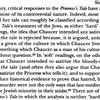3: Text excerpt, Lawrence Besserman’s “Ideology, Antisemitism, and Chaucer's ‘Prioress's Tale,’” 2001.
Some scholars believe that Chaucer was satirizing the prioress and aimed to show through her frivolousness and poor character how misaligned she was with Christian values of charity and fairness. Others believe that Chaucer would have almost certainly been steeped in anti-Semitism and unlikely to have critiqued it; they see “The Prioress’s Tale” as deeply anti-Semitic.
Suggested Activity: Have students read the excerpt discussing different scholars’ interpretations of the prioress’s anti-Semitism. Ask students to think about and list the things that are important to the prioress in the prologue and the tale (e.g., table manners, her dogs, speaking French, being coy) and then to list the things they might expect a woman who dedicates her life to the Church to value. Is the prioress a good nun? Is she a likeable person? Ask students whether they think Chaucer portrayed her sympathetically or whether he exposed her faults, or both. Ask them: if Chaucer was indeed trying to point out the prioress’s (and the Church’s) hypocrisies and biases, was he successful in doing so? Is the tale anti-Semitic?
Source: Lawrence Besserman, "Ideology, Antisemitism, and Chaucer's ‘Prioress's Tale,’" The Chaucer Review 36, no. 1 (2001): 48–72, accessed online.
Besserman Excerpt
 Download image (96.24 KB)
Download image (96.24 KB)

